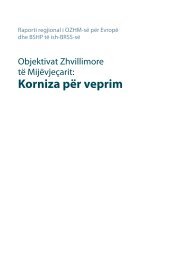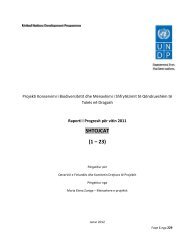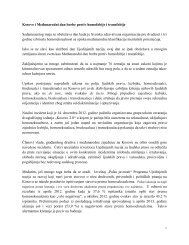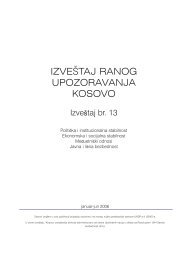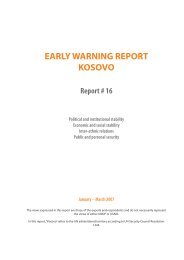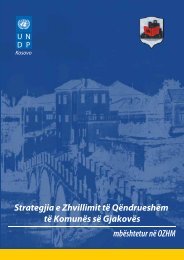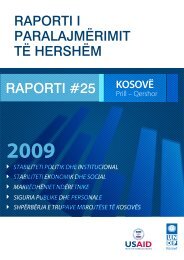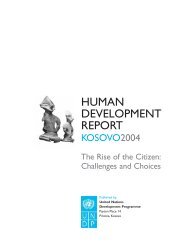Kosovo Human Development Report 2010 - UNDP Kosovo - United ...
Kosovo Human Development Report 2010 - UNDP Kosovo - United ...
Kosovo Human Development Report 2010 - UNDP Kosovo - United ...
You also want an ePaper? Increase the reach of your titles
YUMPU automatically turns print PDFs into web optimized ePapers that Google loves.
tion against certain ethnic groups<br />
(notably <strong>Kosovo</strong>-RAE), are draining<br />
<strong>Kosovo</strong>’s full socio-economic<br />
potential. For women, people with<br />
disabilities, and <strong>Kosovo</strong>-RAE, these<br />
socio-cultural norms have lead to<br />
the practices of self-exclusion from<br />
decision-making processes. Some<br />
groups contribute to exclusion by<br />
either resisting integration (in the<br />
case of <strong>Kosovo</strong>-RAE) or accepting<br />
and passing limitations on through<br />
daughters and other female family<br />
members. Fear of disapproval, ostracization<br />
and even violence are<br />
factors preventing women from<br />
challenging traditional roles and<br />
assuming a greater profile in <strong>Kosovo</strong>’s<br />
political and economic life. Socio-cultural<br />
discrimination is particularly<br />
damaging when it comes<br />
to economic participation (with<br />
women and <strong>Kosovo</strong>-RAE having<br />
the least access to factor markets),<br />
and education. In education, gender<br />
parity is reducing rather than<br />
increasing over time and girls more<br />
often than boys are denied their<br />
right to learn because of poverty,<br />
distance or lack of prioritization.<br />
• Lack of self-reliance has a corrosive<br />
impact on human development:<br />
international assistance to<br />
<strong>Kosovo</strong>, while well meant, has unbalanced<br />
its human development<br />
trajectory. <strong>Kosovo</strong>’s economy has<br />
become dependent on international<br />
transfers, import taxes (made<br />
possible by a large international<br />
presence) and remittances. Its legislative<br />
and policy vision is being<br />
driven by external partners, and<br />
the pace of reform has outstripped<br />
capacity to deliver. Its civil society<br />
has grown to accommodate the<br />
need of international actors to execute<br />
aid budgets – limiting “natural<br />
selection” for NGOs whereby<br />
94 | KOSOVO HUMAN DEVELOPMENT REPORT <strong>2010</strong><br />
only those genuinely valuable as<br />
a community factor would find<br />
sustainable domestic funding and<br />
thrive. Self reliance is a critical factor,<br />
therefore, in creating the necessary<br />
conditions for social inclusion<br />
to truly take root as <strong>Kosovo</strong><br />
accepts the reality that its future is<br />
ultimately its own responsibility.<br />
(ii) While exclusion is a broad phenomenon,<br />
some groups are particularly<br />
affected and require special support<br />
1. Long-term unemployed: considering<br />
<strong>Kosovo</strong>’s jobless GDP growth and<br />
high fertility rates, most unemployment<br />
in <strong>Kosovo</strong> is long-term. Nearly<br />
82 percent of the unemployed<br />
are out of work for more than 12<br />
months. The social safety nets represented<br />
by the family ends as children<br />
age, creating extreme vulnerability<br />
for the long-term unemployed and<br />
their families. Social assistance is not<br />
targeted to reduce dependency and<br />
there is an important absence of jobseeker<br />
schemes and learning opportunities.<br />
Unemployment precludes<br />
full access to health care (due to<br />
costs), limits the cycle of learning, increases<br />
the risk of poverty even with<br />
access to other factor markets and<br />
increases the risk of exclusion from<br />
public utilities and services. Education<br />
rates are lower among the unemployed.<br />
Rates of exclusion from<br />
factor markets are four times higher<br />
among those with under 10 years<br />
of schooling compared with those<br />
with 17 years or more. Unemployed<br />
families and their children are more<br />
likely to be excluded from learning,<br />
and more likely to require children to<br />
work to supplement family incomes.



